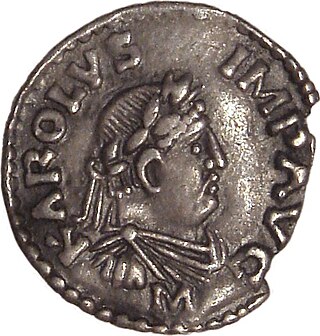
Charlemagne or Charles the Great, a member of the Carolingian dynasty, was King of the Franks from 768, King of the Lombards from 774, and the Emperor of the Romans from 800. Charlemagne succeeded in uniting the majority of western and central Europe and was the first recognized emperor to rule from western Europe after the fall of the Western Roman Empire approximately three centuries earlier. The expanded Frankish state that Charlemagne founded was the Carolingian Empire, which is considered the first phase in the history of the Holy Roman Empire. He was canonized by Antipope Paschal III—an act later treated as invalid—and he is now regarded by some as beatified in the Catholic Church.
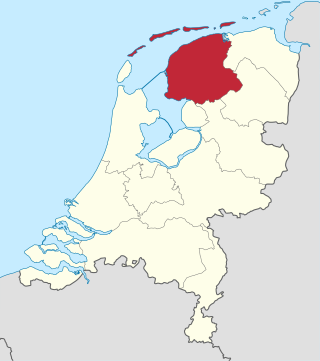
Friesland, historically and traditionally known as Frisia, named after the Frisians, is a province of the Netherlands located in the country's northern part. It is situated west of Groningen, northwest of Drenthe and Overijssel, north of Flevoland, northeast of North Holland, and south of the Wadden Sea. As of January 2020, the province had a population of 649,944 and a total area of 5,749 km2 (2,220 sq mi).
The Frisians are an ethnic group indigenous to the coastal regions of the Netherlands and northwestern Germany. They inhabit an area known as Frisia and are concentrated in the Dutch provinces of Friesland and Groningen and, in Germany, East Frisia and North Frisia. The name is probably derived from frisselje. The Frisian languages are spoken by more than 500,000 people; West Frisian is officially recognised in the Netherlands, and North Frisian and Saterland Frisian are recognised as regional languages in Germany.

The Saxons were a group of Germanic peoples whose name was given in the early Middle Ages to a large country near the North Sea coast of northern Germania, in what is now Germany. In the late Roman Empire, the name was used to refer to Germanic coastal raiders, and in a similar sense to the later "Viking". Their origins are believed to be in or near the German North Sea coast where they appear later, in Carolingian times. In Merovingian times, continental Saxons had been associated with the activity and settlements on the coast of what later became Normandy. Their precise origins are uncertain, and they are sometimes described as fighting inland, coming into conflict with the Franks and Thuringians. There is possibly a single classical reference to a smaller homeland of an early Saxon tribe, but its interpretation is disputed. According to this proposal, the Saxons' earliest area of settlement is believed to have been Northern Albingia. This general area is close to the probable homeland of the Angles.

Year 793 (DCCXCIII) was a common year starting on Tuesday of the Julian calendar. The denomination 793 for this year has been used since the early medieval period, when the Anno Domini calendar era became the prevalent method in Europe for naming years.

Frisia is a cross-border cultural region in Northwestern Europe. Stretching along the Wadden Sea, it encompasses the north of the Netherlands and parts of northwestern Germany. The region is traditionally inhabited by the Frisians, a West Germanic ethnic group.
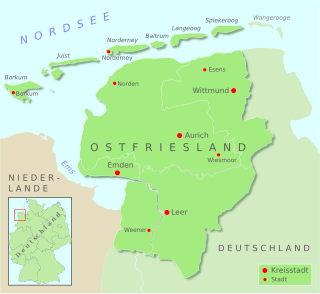
East Frisia or East Friesland is a historic region in the northwest of Lower Saxony, Germany. It is primarily located on the western half of the East Frisian peninsula, to the east of West Frisia and to the west of Landkreis Friesland.
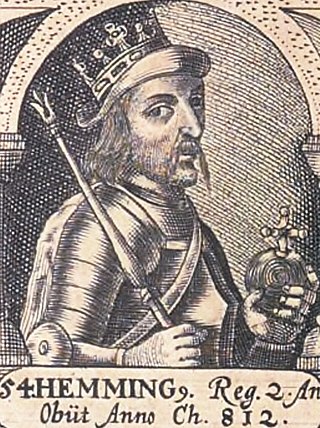
Hemming I was a king in Denmark from 810 until his death. He was the successor of King Gudfred, his uncle.

Francia, also called the Kingdom of the Franks, Frankish Kingdom, Frankland or Frankish Empire, was the largest post-Roman barbarian kingdom in Western Europe. It was ruled by the Frankish Merovingian and Carolingian dynasties during the Early Middle Ages. Francia was among the last surviving Germanic kingdoms from the Migration Period era.

Eala Frya Fresena is the motto for the coat of arms of East Frisia in northern Germany. The motto is often mistranslated as "Hail, free Frisians!", but it was the reversal of the feudal prostration and is better translated as "Stand up, free Frisians!". According to 16th century sources, it was spoken at the Upstalsboom in Aurich where Frisian judges meet on Pentecost and it is traditionally answered with Lever dood as Slaav, or in English, rather dead than slaves.
Lex Frisionum, the "Law Code of the Frisians", was recorded in Latin during the reign of Charlemagne, after the year 785, when the Frankish conquest of Frisia was completed by the final defeat of the Saxon rebel leader Widukind. The law code covered the region of the Frisians.

Magnus Forteman (809) was the legendary first potestaat and commander of Frisia which is now part of Germany and the Netherlands. His existence is based on a sage's writings.

Frisian freedom was the absence of feudalism and serfdom in Frisia, the area that was originally inhabited by the Frisians. Historical Frisia included the modern provinces of Friesland and Groningen, and the area of West Friesland, in the Netherlands, and East Friesland in Germany. During the period of Frisian freedom the area did not have a sovereign lord who owned and administered the land. The freedom of the Frisians developed in the context of ongoing disputes over the rights of local nobility.
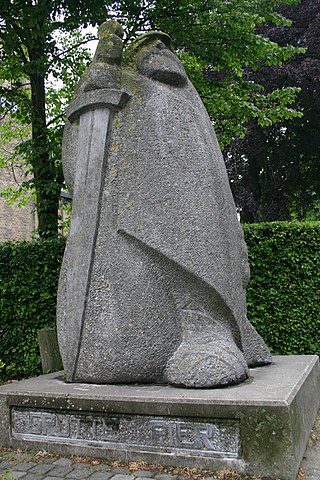
Frisia has changed dramatically over time, both through floods and through a change in identity. It is part of the Nordwestblock which is a hypothetical historic region linked by language and culture,where they may have spoken an Indo-European language which was neither germanic nor celtic.

The Frisian–Frankish wars were a series of conflicts between the Frankish Empire and the Frisian kingdom in the 7th and 8th centuries.

The Frisian Kingdom, also known as Magna Frisia, is a modern name for the post-Roman Frisian realm in Western Europe in the period when it was at its largest (650–734). This dominion was ruled by kings and emerged in the mid-7th century and probably ended with the Battle of the Boarn in 734 when the Frisians were defeated by the Frankish Empire. It lay mainly in what is now the Netherlands and – according to some 19th century authors – extended from the Zwin near Bruges in Belgium to the Weser in Germany. The center of power was the city of Utrecht.

Christianity in the 8th century was much affected by the rise of Islam in the Middle East. By the late 8th century, the Muslim empire had conquered all of Persia and parts of the Eastern Roman (Byzantine) territory including Egypt, Palestine, and Syria. Suddenly parts of the Christian world were under Muslim rule. Over the coming centuries the Muslim nations became some of the most powerful in the Mediterranean basin.
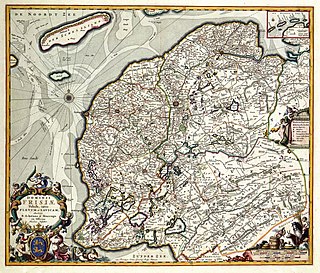
The Lordship of Frisia or Lordship of Friesland was a feudal dominion in the Netherlands. It was formed in 1498 by King Maximilian I and reformed in 1524 when Emperor Charles V conquered Frisia.
The Netherlands in the early Middle Ages was inhabited by various Germanic tribes, including the Frisians, who played a significant role in the development of the region and its Christianisation and eventual incorporation into the Frankish Empire.